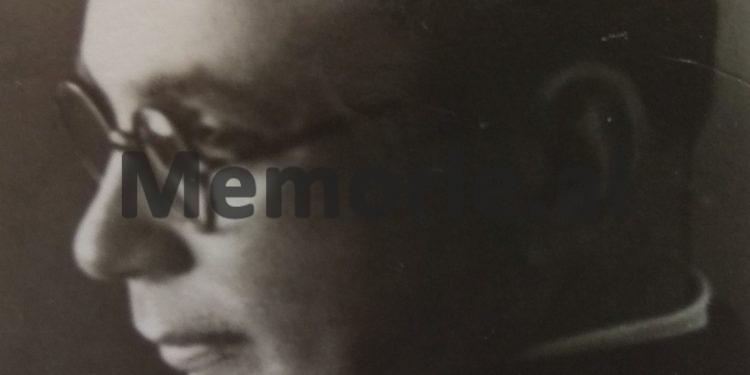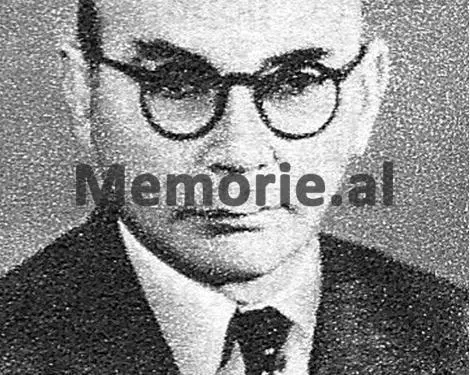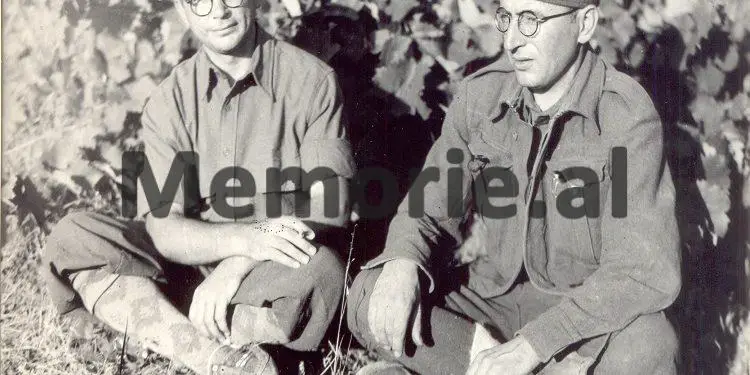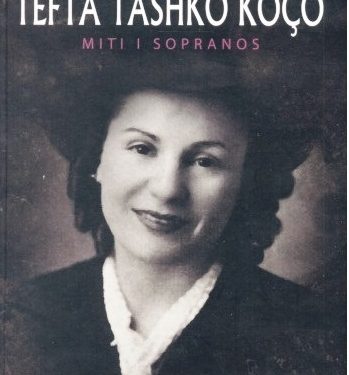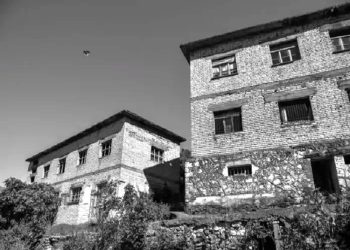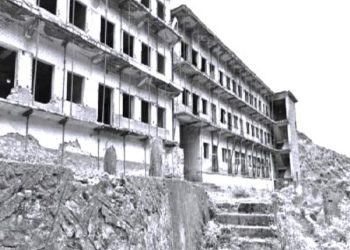Memorie.al /It were the beginning of September 1966 when fate would privilege me to meet and talk for just a few moments with my Rector of the Higher Agricultural Institute, the scientist Gaqo Tashko. For the “trouble” I was having, my friends advised me that only the Rector, and no one else, could solve it and clear the path. But what trouble did I have, a student who had just finished gymnasium and had been granted the right to pursue studies in veterinary medicine at this Institute? Well, here lay the problem, which I couldn’t resolve.
I didn’t like the Faculty I had been granted the right to study at, the Veterinary Faculty, from the day they informed me. But those who prompted me to make up my mind not to accept going to lectures were two or three weak horses, barely able to stand, grazing at their leisure on the grassy square in front of the faculty building. In the few days I went to attend classes, the horses stayed on my mind. I asked someone and received the answer that those poor animals were used for experiments, mainly for students to learn animal anatomy, but also for other problems. But try to convince me when the skeletal horses appeared to me even in my sleep, and that I would deal with them all my life. I won’t go anymore; I told myself, I will change faculties. And yes, precisely this forced me to knock on the Rector’s door, the scientist Gaqo Tashko.
He received me warmly, as if I were his own son. He was short-bodied with a round face. He wore silver-rimmed glasses and had a philosopher’s forehead, but without hair. He didn’t invite me to sit down but asked: “Well, you seem to have a problem?” He spoke slowly, with clear and understandable words.
“Yes,” I said. “I want to change faculties. Skrapar district sent me to study veterinary medicine, but I don’t like it.”
He put down the stylus he was holding until then, ready to continue writing on the papers in front of him, and stood up straight, looking me directly in the eye, slightly surprised.
“But the Veterinary Faculty is one of the most sought-after, one of the best, my boy, why should you leave it, what has happened to you?”
“No, no, I don’t want it, but if you can, Comrade Rector, help me, I have no one else to ask.”
“And where do you want to study?” he asked quietly, and it seemed to me that I had put him in an awkward position.
“Agronomy,” I replied, “where else.”
In truth, I didn’t even want agronomy, but where should I go, while the skeletal horses that frightened me just by looking at them kept appearing even in my sleep?
I felt that he was showing parental care for solving my problem. He gave me a piece of paper, where he noted that I should be transferred from one faculty to the other, and shook my hand, meaning the problem I had was solved. In the few minutes I stayed there, I learned that my Rector, Gaqo Tashko, radiated only goodness and simplicity, traits and reflections of an educated and cultured man, a descendant of a great family.
Fate is not always on every person’s side. It often proves to be “heartless,” a fact that compels you to feel humble in order to cultivate the best virtues within yourself, just as Gaqo Tashko began and ended his life. So, what was his journey, what paths did he take to become strong and smart, to remain an illustrious name in the history of Albanian agriculture?
Gaqo Tashko was born on March 3, 1905, in Fayoum, a city located near Cairo. He was the son of the distinguished Albanian patriot, Thanas Tashko, from Frashër, Përmet, who had settled with his family in Egypt, like many other Albanians, driven by the need for a better life. Gaqo was nurtured with patriotic feelings from a very young age. Not because his father, Thanas, was such a person, but because the door of the Tashko family in Fayoum was always open to welcome and see off the most renowned intellectuals of that time, who were engaged in patriotic activity.
Most of the guests who entered that house were the cream of Albanian patriotism in Egypt. Throughout his life, Gaqo Tashko considered himself fortunate to have closely seen Çajupi, Spiro Dine, Jani Vruho, Filip Shiroka, and many others. But the Tashko family’s emigration to Egypt did not go well. They received a major blow in 1915, the year the pillar of the family, Thanas, passed away. The children were left orphaned, while Gaqo was only 10 years old. Under these conditions, the family was forced to return to Korçë in 1921. Economic difficulties were great, almost unbearable. Efforts could have been made for Gaqo, still underage, to start some work somewhere, but the Tashko family was inclined towards something else: not to teach the child how to become rich, but how to become happy.
For this reason, Gaqo had to be educated. He began primary school in Korçë, in the Albanian language, but family circumstances forced him to finish it in his birthplace, Fayoum, in the Arabic language. He continued the next level of education at the French Lyceum of Alexandria, where he received the Certificate of Secondary Studies, as it was called, with results that ranked him among the top students. Certainly, his brilliance in studies made him optimistic about progressing further; thus, he would not interrupt his schooling.
He completed his secondary studies between 1922 and 1925 in Vienna, Austria. In Vienna, with the desire to be fully formed as a person and as a specialist, he also enrolled to complete his higher education (1926-1930) at the Higher School of Agronomy (Hochschule für Bodencultur in Wien), where he graduated as an Agronomist Engineer. It should be mentioned that Gaqo Tashko initially covered his expenses, as well as his obligations to the school, by working various ordinary jobs, usually preferred by students. Late, very late, he was granted a half-scholarship, and only at the end did the government of the time “sacrifice itself” to give him a full scholarship. The truth is that the hardships and difficulties made him stronger and more capable, creating opportunities for him to get to know people and characters from different nations. It is no coincidence that Gaqo Tashko was very proficient in German, French, English, Italian, Arabic, and Russian. He had great abilities to communicate with every category, simple or educated people.
But the student Gaqo Tashko loved the Albanian language and Albania the most. He was one of those people whom the suffering or even a harsh word about his country would wind his heart. This feeling made him an active part of the Association of Albanian Students in Vienna, where he distinguished himself and made a good name, being mentioned as an example among all the contingents of students who came to study year after year in the Austrian capital. Gaqo Tashko loved his country, even though he greatly respected Austria, the city of Vienna, where he was educated and gained Western culture. Between these two loves, he chose Albania.
After returning to Albania, Gaqo Tashko initially worked as an agronomist. Although there was no slogan, “let’s work where the Homeland calls us,” he truly went where the work required the word of the agricultural specialist. For about four years, he worked as such in Kavajë, Elbasan, and Tirana. Thanks to his good work and abilities for leadership and organization, he was appointed as Deputy Director of the Agricultural School in Lushnjë. He stayed there until the beginning of 1935.
Gaqo Tashko was a specialist who followed the progress of science step by step, the developments that placed agriculture on sound foundations of advancement and development. Due to these impressive qualities, he appeared everywhere. Thus, every assessment was a gift, thanks to his ability and intellect, to tread on unpaved ground.
It was this fact that made him stand out from others and that, at the beginning of 1935; he went to complete a special specialization in France, in the field of cereal seed selection, at the Institute of Agronomic Research of Paris, the Experimental Station of Dijon, and the Institute of Agronomic Research of Versailles. The specialization there lasted one year. A year later, in 1936, he presented himself again in the Austrian capital, at the Hochschule für Bodencultur, to defend his dissertation on the topic: “Research on the Xerophily of Several Varieties of Winter Cereals” (Kërkime mbi kserofilinë, e disa varieteteve të drithërave dimërorë), to obtain the scientific degree, “Doctor of Agronomic Sciences.”
The future scientist Gaqo Tashko defended his Doctoral thesis at the University of Vienna on June 4, 1936. Convinced of his high level of preparation, he confidently spoke before the commission, because before this “general rehearsal,” he had previously conducted analyses at the Laboratory of Biology and Plant Protection in Paris. This degree was granted to him at the plenary session on July 27, 1936. Let’s pause here for a moment. Gaqo Tashko was so “infected” with the disease of being a patriot and nationalist that he neither feared nor blushed from the presence of the highest scientific authorities of the University, of a Western city, when he wrote the dedication at the beginning of the study: “To the Albanian people, who made my studies possible.”
We see the student, now a graduate and doctor in a specific field of agriculture, from another position: that solely out of desire and passion, from the effort and care he showed on the path to education, he had managed to become a truly knowledgeable person. The elevation of his level of specialization after returning to Albania would inevitably await new, higher, and more responsible duties.
From that year until 1939, i.e., three years, he worked at the Ministry of Economy, as an official and Director of agricultural scientific experimentation. But he was not one of those specialists who would “warm eggs” in the office; instead, he put his mind and knowledge to work to bring innovation to agricultural development. During this time, he mainly dealt with the analysis of seeds and scientific experimentation in open fields, traveling several times to Italy to check their quality, but also to contact capable specialists and the modern practices applied there, because it was the time when the Seed Selection Station (1936-1937), the first of its kind in Albania, was established in Tirana.
Meanwhile, because they needed him, the “declared anti-Zogist” was allowed to work at the Ministry of Agriculture during 1939-1943, as an official, and at the end of that year, as Director of Agriculture. The Tashko family was entirely connected to the National Liberation War. Among them, Gaqo, with his brother Koço. Let’s remember that the distinguished lyrical singer, Tefta Tashko Koço (1910-1947), was the sister of the Tashko brothers.
In 1943, Gaqo Tashko went underground and later joined the General National Liberation Council. His activity and authority as an intellectual dictated that he be selected to participate in the Mukje Meeting (August 1-3, 1943). Certainly, as a nationalist, because Gaqo was not a party member. Furthermore, he had been noted for his contribution and determination to see the started path through to the end, that of the liberation of the country from the Nazi-Fascist occupiers. It was May 24, 1944, when he was appointed to go, along with 188 other fighters from all over the country, as a delegate to the Congress of Përmet where he was also elected a member of the General National Liberation Council.
After the liberation, Dr. Gaqo Tashko was highly sought after to work in the agricultural sector, which in the first months after liberation was part of the Ministry of Economy. Exactly until 1945. With the creation of the Ministry of Agriculture in 1946, the well-known specialist, Gaqo Tashko, was appointed to the high position of Minister of Agriculture, a post he held until 1950. It is a historical fact that the appointment of Dr. Gaqo Tashko, as a man educated in the West, to lead the most important and difficult department of the time, such as Agriculture, would bring a noticeable leap, innovations that had not been seen until then.
His arrival at the head of the department created conditions to address the key problems of agricultural development with entirely new concepts. During those years, great overhauls were made in form and content, showing special care for the organization of agricultural mechanization, land drainage and reclamation, irrigation, the reorganization of seed production, plant protection, etc. Let’s not forget that this leap in development occurred at a time when agriculture was completely backward, at primitive levels. Many scientific institutions, which were part of the first post-liberation efforts to rehabilitate agriculture, were established and put into operation when the knowledgeable Prof. Gaqo Tashko was Minister of Agriculture. He was also wise and humane. Due to his culture and formation as an intellectual, his “heart was full” to serve people.
From 1950, the Ministry of Forests was established for the first time in the history of Albanian agriculture. Due to the mentality and undervaluation that had been done until then to forest management, that is, to start a new beginning and to place forestry where it belonged, Prof. Gaqo Tashko was appointed to head this ministry. He led it for a full three years, until 1953. These three years remained among the most successful and were long remembered for the care shown for forest management. This is the period when he gave qualified assistance in leading and presenting projects for laws and regulations in the field of agriculture (1945-1950) and forests (1950-1953), as well as serving as a scientific consultant for drainage and irrigation issues. Prof. Tashko is also the author of 15 scientific publications.
The work and scientific treatment applied to the overall transformation of forestry had a noticeable and direct impact on strengthening the Albanian economy. Let’s remember that forestry specialists in those years when the ministry was created were counted on the fingers of one hand. It had to be the visionary leader and specialist Gaqo Tashko for the major turning point to occur.
In the following years, until 1958, Gaqo Tashko held the function of Deputy Minister in the Ministry of Forests and Agriculture, the year in which he was selected to lead the school for the preparation of high-level specialists (the Higher Agricultural Institute), replacing the other personality of agriculture, Pirro Dodbiba.
Prof. Gaqo Tashko came to head the school that would prepare specialists with higher agricultural education, as Rector of the Higher Agricultural Institute, with the motto: “What we know is limited, and what we do not know is infinite.” And powerful minds, like that of Prof. Gaqo Tashko, are distinguished precisely by that inner strength that enables them not to succumb to routine work, results coming from atrophied minds.
We must stand up when we mention the name of the scientist Gaqo Tashko also for the fact that during the years he led the Higher Agricultural Institute, which started its activity in November 1951 with 43 students and two faculties (Agronomy and Veterinary Medicine), reached the record number of 6,000 students and 5 faculties in 1990. Thousands of cadres and specialists with higher education emerged from its auditoriums and went into the service of agricultural development and progress. But the value and “investment” of this great agricultural scholar, which is remembered by generations, was his appreciation and insistence on the comprehensive strengthening of the academic teaching body, the widest possible inclusion in scientific work, and the professional formation and patriotic education of the student youth.
It was his hand and mind that managed to establish and secure laboratory equipment for the curriculum, reorganize the Agricultural Research Station in Kamëz, and many other valuable works. Regarding the coordination of the curriculum with scientific work in the field, he remained an excellent example until the end. He was the first when he undertook the study for improving the protein balance of forage foods, a study for which he was also awarded the title of Professor. To achieve this, he connected with and was previously familiar with the work of Mediterranean Institutes, drafted and specified methodologies, and operated with literature directly in the original languages.
We also bring another fact that shows and sheds light on the character and heroic endurance of Prof. Gaqo Tashko. He was fully aware of the incurable disease that had struck him and would not spare him, but even three months before his death, he calmly and correctly checked the experiments in the field, and personally went to see the last scientific work, there in the plots of land where he experimented.
So this was the great Gaqo Tashko, who never transformed into another person, until he passed away on February 17, 1967.
Gaqo Tashko went through many ups and downs during his life, but thanks to his intellect and strong character, he succeeded with great success. He knew how to find and put on the “shoes” he needed to walk on entirely unpaved roads, sometimes thorny, difficult, and frightening. But he succeeded, and his name is what it is. Gaqo Tashko holds the title of Professor (1965) and six high decorations, such as; “Order of the Flag,” “Order of the Red Flag of Labor, Second Class,” “Medal of Bravery,” “Order of Labor, Second Class.” Prof. Gaqo Tashko was elected a deputy in six legislatures of the People’s Assembly./Memorie.al




